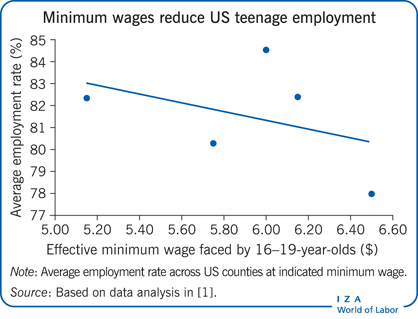Elevator pitch
Policymakers often propose a minimum wage as a means of raising incomes and lifting workers out of poverty. However, improvements in some young workers’ incomes as a result of a minimum wage come at a cost to others. Minimum wages reduce employment opportunities for youths and create unemployment. Workers miss out on on-the-job training opportunities that would have been paid for by reduced wages upfront but would have resulted in higher wages later. Youths who cannot find jobs must be supported by their families or by the social welfare system. Delayed entry into the labor market reduces the lifetime income stream of young unskilled workers.
Key findings
Pros
Imposing a minimum wage may increase the income of working youths if their hours of work are not reduced in response to the minimum wage.
Minimum wages may increase the aggregate income of youths if the gains for those who work exceed the losses for those who cannot find work.
In the rare instance where an employer has market power over wages, imposing a minimum wage could boost employment among youths.
Some studies argue that the negative empirical results found in other studies of minimum wage imposition are a result of methodological flaws.
Cons
In a competitive labor market for young unskilled workers, minimum wages reduce youth employment.
A minimum wage reduces lifetime income by delaying the labor market entry of youths who fail to obtain jobs at the higher (minimum) wage.
Minimum wages create youth unemployment by increasing the number of job seekers and reducing the number of jobs available.
Minimum wages reduce on-the-job training opportunities and thus youths’ lifetime income.
